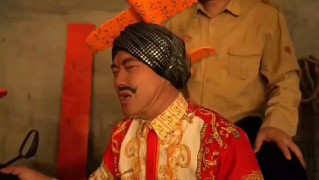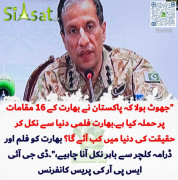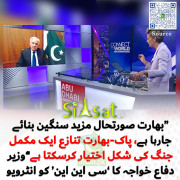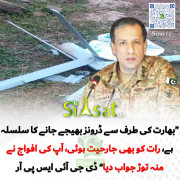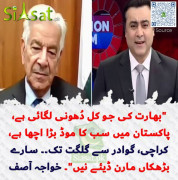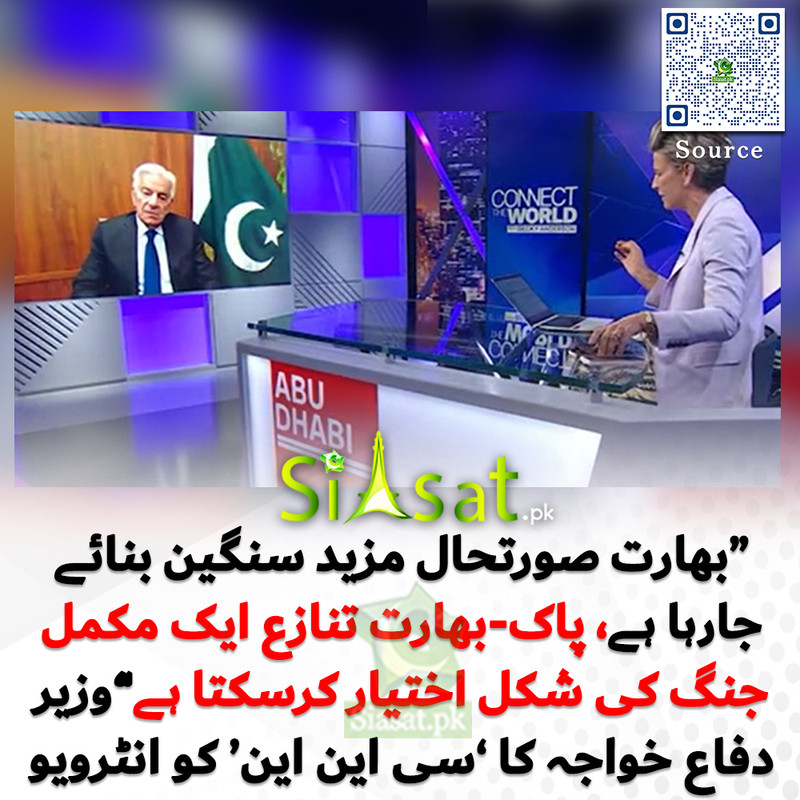A
arshad_lahore
Guest
Standing on our own feet
In the national interest
Monday, June 15, 2009
Kamal Siddiqi
The writer is editor reporting, The News
How difficult is it for a nation to stand on its own feet? We have examples around us in the form of India, China and Iranall three our immediate neighbours. Economic strength has given them the courage and confidence to take a stand when it comes to their national interest. In Pakistan, the opposite seems to be the case.
We have a history of being led by dictators that are propped by American aid. It is somewhat ironic that American governments have been happy to bankroll our military leaders but were reluctant to help out our emerging democrats. And history tells us that it is our military strongmen that have bent more willingly when pressured from the outside.
Why is it that we as Pakistanis look at foreign help as some sort of recipe that is the cure for all our ills? This week, American legislators will give thumbs-up to yet another aid programme for Pakistan. Do we need this package? Granted that we are once again finding ourselves in an economic mess, but is there no other way we can pull ourselves out of it? Also, will we be told of the strings attached to this?
We are told that this aid package is different. Firstly, it is being given to a government with democratic credentials. Secondly, its thrust will not be military aid but to help Pakistan help itself economically and on the human development front.
Pakistan is a nightmare when it comes to basic services like education, health, water and sanitation. For decades international financial institutions, the UN and friendly governments have been trying to help us improve the quality of life of the average Pakistani. But the difference, barring some exceptions, has been marginal. Largely to blame are we ourselves our government and our corrupt leaders and bureaucrats.
With the aid package sealed this month, our government is happy to show that this is the beginning of an economic revival. Some say with a sigh that Pakistan is possibly one of the few countries in the world which celebrate when they are burdened with more debt.
There are others who argue that the American help that we will be receiving comes at a price. If past precedents are anything to go by, this may well be true. Every time we are burdened with a new aid package, it comes with the same set of promises. Our leaders promise not to steal the money, the Americans promise not to leave us in midstream.
What is it in President Obamas package that the Pakistani government thinks will change the current state of affairs in the country? Already, most Pakistanis are saying that the Swat operation is being fought at the behest of the Americans. Some say that is why the Americans are giving us more money.
There is some truth in this. President Zardari has said that he does not have the money to bring the economic revival that is needed as a follow-up to the war in Swat and the other regions affected by militancy. We are told by President Zardari and others that unless the military action is followed by an economic one, the war against the militancy and extremism will remain a lost cause.
We are told that one of the reasons for the rise in the popularity of the Taliban was the economic deprivation in the areas of Swat and in other parts of the NWFP. A high unemployment rate, coupled with easy access to arms and ammunition, is usually a lethal combination.
But will we have the economic revolution in place once the Taliban depart and the Pakistani government establishes its writ? If we are to see the capability of the Pakistan government in terms of setting up economic opportunities, it has a poor record card by any standard. It also has a poor record when it comes to implementing foreign funded programmes. Possibly that is why the Americans are setting up an office in Islamabad to monitor spending and allocations. But who will monitor the Americans, who are equally wasteful on aid projects.
Then again, what role with the Americans play in all this? More important, why should the Americans keep on bankrolling us, especially when they insist on their formulas, irrespective of the fact that local wisdom suggests otherwise. Will we have the capacity to say no?
Where are we in all this? In all honesty, this is our mess. We should be cleaning it. By increasing American involvement in our internal affairs, we are inviting more trouble. We cannot continue to live on handouts. More important, the solutions to our problems lie within, not in Washington.
So far, the democratically elected government has disappointed on many fronts. But to give it credit, Shaukat Tarin and his team have saved us from the economic crisis that was once on the verge of happening. But we are barely keeping our head above the water. And this is a worry that is shared by the rest of the world.
As a first step, we are missing direction. There is no game plan in place that determines how we move ahead. Our government is working on a day-to-day basis when the people want to see the larger picture. People want to know what the government is doing to fight inflation. Both food and fuel prices have come down internationally, but this has not been reflected in the local markets. Some wonder whether the government can stand up to the mafias that exploit supply chains in Pakistan.
We also want to know what the government plans to do after the Swat operation. How will the refugee crisis be tackled in the coming months? What plans does the government have in terms of rehabilitation of the refugees and the economic revival of the area? People need to be given something to look forward to. This is not happening. What is the government doing about the political fallout of its war against the militancy?
As things stand, the war for the hearts and minds of Pakistanis is yet to be won. Most Pakistanis are still not convinced on the operation being wages in the tribal areas. Why is the government still unable to present its case clearly? Why is there not enough debate on this in our media?
On the economic front too, the government does not have the larger picture. What is our plan for exports? How do we plan to raise taxes in the next five years? What do we intend to do with our privatisation program? Why are we doling out more jobs in government service when we should be working on the private sector?
There are times when the people want to see the government take charge. Like it has done in Swat, although some say that this came too late and at great human cost. One would like to ask the president what he is doing about law and order. Crime and violence in our cities is increasing significantly. People have lost faith in the policing system and are questioning the efficacy of our judicial system.
The president and the present leadership should become more sympathetic to the plight of the common man. It is not a time to make foreign trips but to reassure the people that the country is moving towards a brighter future. So far, for most Pakistanis there seems to be no light at the end of the tunnel. Pakistan has become the sick man of South Asia. The government needs to take a more serious view of governance and chart a course for the future. And in this it should keep the countrys interests paramount, not only those who keep bankrolling our future.
In the national interest
Monday, June 15, 2009
Kamal Siddiqi
The writer is editor reporting, The News
How difficult is it for a nation to stand on its own feet? We have examples around us in the form of India, China and Iranall three our immediate neighbours. Economic strength has given them the courage and confidence to take a stand when it comes to their national interest. In Pakistan, the opposite seems to be the case.
We have a history of being led by dictators that are propped by American aid. It is somewhat ironic that American governments have been happy to bankroll our military leaders but were reluctant to help out our emerging democrats. And history tells us that it is our military strongmen that have bent more willingly when pressured from the outside.
Why is it that we as Pakistanis look at foreign help as some sort of recipe that is the cure for all our ills? This week, American legislators will give thumbs-up to yet another aid programme for Pakistan. Do we need this package? Granted that we are once again finding ourselves in an economic mess, but is there no other way we can pull ourselves out of it? Also, will we be told of the strings attached to this?
We are told that this aid package is different. Firstly, it is being given to a government with democratic credentials. Secondly, its thrust will not be military aid but to help Pakistan help itself economically and on the human development front.
Pakistan is a nightmare when it comes to basic services like education, health, water and sanitation. For decades international financial institutions, the UN and friendly governments have been trying to help us improve the quality of life of the average Pakistani. But the difference, barring some exceptions, has been marginal. Largely to blame are we ourselves our government and our corrupt leaders and bureaucrats.
With the aid package sealed this month, our government is happy to show that this is the beginning of an economic revival. Some say with a sigh that Pakistan is possibly one of the few countries in the world which celebrate when they are burdened with more debt.
There are others who argue that the American help that we will be receiving comes at a price. If past precedents are anything to go by, this may well be true. Every time we are burdened with a new aid package, it comes with the same set of promises. Our leaders promise not to steal the money, the Americans promise not to leave us in midstream.
What is it in President Obamas package that the Pakistani government thinks will change the current state of affairs in the country? Already, most Pakistanis are saying that the Swat operation is being fought at the behest of the Americans. Some say that is why the Americans are giving us more money.
There is some truth in this. President Zardari has said that he does not have the money to bring the economic revival that is needed as a follow-up to the war in Swat and the other regions affected by militancy. We are told by President Zardari and others that unless the military action is followed by an economic one, the war against the militancy and extremism will remain a lost cause.
We are told that one of the reasons for the rise in the popularity of the Taliban was the economic deprivation in the areas of Swat and in other parts of the NWFP. A high unemployment rate, coupled with easy access to arms and ammunition, is usually a lethal combination.
But will we have the economic revolution in place once the Taliban depart and the Pakistani government establishes its writ? If we are to see the capability of the Pakistan government in terms of setting up economic opportunities, it has a poor record card by any standard. It also has a poor record when it comes to implementing foreign funded programmes. Possibly that is why the Americans are setting up an office in Islamabad to monitor spending and allocations. But who will monitor the Americans, who are equally wasteful on aid projects.
Then again, what role with the Americans play in all this? More important, why should the Americans keep on bankrolling us, especially when they insist on their formulas, irrespective of the fact that local wisdom suggests otherwise. Will we have the capacity to say no?
Where are we in all this? In all honesty, this is our mess. We should be cleaning it. By increasing American involvement in our internal affairs, we are inviting more trouble. We cannot continue to live on handouts. More important, the solutions to our problems lie within, not in Washington.
So far, the democratically elected government has disappointed on many fronts. But to give it credit, Shaukat Tarin and his team have saved us from the economic crisis that was once on the verge of happening. But we are barely keeping our head above the water. And this is a worry that is shared by the rest of the world.
As a first step, we are missing direction. There is no game plan in place that determines how we move ahead. Our government is working on a day-to-day basis when the people want to see the larger picture. People want to know what the government is doing to fight inflation. Both food and fuel prices have come down internationally, but this has not been reflected in the local markets. Some wonder whether the government can stand up to the mafias that exploit supply chains in Pakistan.
We also want to know what the government plans to do after the Swat operation. How will the refugee crisis be tackled in the coming months? What plans does the government have in terms of rehabilitation of the refugees and the economic revival of the area? People need to be given something to look forward to. This is not happening. What is the government doing about the political fallout of its war against the militancy?
As things stand, the war for the hearts and minds of Pakistanis is yet to be won. Most Pakistanis are still not convinced on the operation being wages in the tribal areas. Why is the government still unable to present its case clearly? Why is there not enough debate on this in our media?
On the economic front too, the government does not have the larger picture. What is our plan for exports? How do we plan to raise taxes in the next five years? What do we intend to do with our privatisation program? Why are we doling out more jobs in government service when we should be working on the private sector?
There are times when the people want to see the government take charge. Like it has done in Swat, although some say that this came too late and at great human cost. One would like to ask the president what he is doing about law and order. Crime and violence in our cities is increasing significantly. People have lost faith in the policing system and are questioning the efficacy of our judicial system.
The president and the present leadership should become more sympathetic to the plight of the common man. It is not a time to make foreign trips but to reassure the people that the country is moving towards a brighter future. So far, for most Pakistanis there seems to be no light at the end of the tunnel. Pakistan has become the sick man of South Asia. The government needs to take a more serious view of governance and chart a course for the future. And in this it should keep the countrys interests paramount, not only those who keep bankrolling our future.


